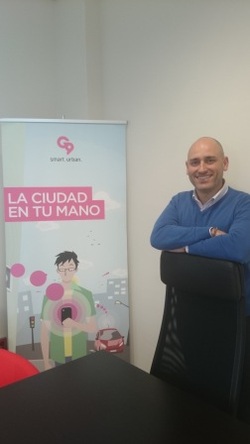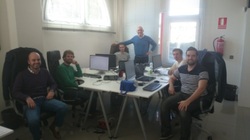 Juanjo Martín, Founder of G9 Juanjo Martín, Founder of G9 Smart cities are the big bet of the future and startups as Gestion Nueve (G9) are trying to become a reality. Juanjo Martin is the founder of Gestión Nueve, a startup in the scaling phase that know what it is to sell its services to cities. 1. Describe G9 in under 50 words G9 is a startup which goal is building a triangle which connects users, city services providers and payments in an urban environment. We put our focus in creating great value for both the users and, of course, our clients (the service providers). Tell us the G9 story. How and why was this project born? G9 has just become 3 years old. It was born in April 2011 after a failed project, on which we made nearly every possible mistake in the process of forging a business from an idea. I spent a couple months analyzing our mistakes and I got quite a few lessons learned. That greatly helped me to keep focus when starting the G9 idea. I wanted to explore a few ideas focused on easing the city-citizens relations and sat down with a couple of developers involved in that previous failed project. We narrowed the focus and built a proof of concept (MVP). We took it to Telefonica Movilforum program and they invited as to become partners of the program at no cost. We found our first early adopter customer, SMASSA, signed a contract and started building the first version of the service. Ten months after the project started, our first service was put into production. Why is G9 going to get success in the field of Smart City? What are you doing different from your competitors? I think that the main difference is that we clearly know WHY we are doing what we do. There are many other solutions out there trying to solve the same or similar problems, build by the services operators themselves, traditional systems integrators and generalist IT consultants. We think these solutions don't solve the problems they try to solve because they focus only on part of the problem. Either they only create value for the provider or the user. Sometimes even to none of them. Since the very beginning we always thought our service has to create value for the service provider, enabling new services, reducing costs and creating a new channels with their customers. And at the same time provide the users a solution that really eases the service usage and let them take informed and instant service usage decisions. We put a great effort in understanding the whole service life cycle and the users interaction with it.  Startup Team. G9 Team Members Startup Team. G9 Team Members What is the most challenging part of building G9? For sure, finding the right people. I've been involved in the foundation of quite a few business projects in the last 15 years, but this is the first adventure I started just on my own. In the beginning financial resources are scarce and my best bet to get people on board, once I found the right ones, was being able to convert my vision into a shared vision. I admit that during this journey I was quite lucky and, although there were really hard (even harsh) moments, now we have the best team I have ever been part of. I would like to take this opportunity to say thanks to Eduardo, Alejandro Vera, Ismael and Alejandro Gómez, David, Sergio and specially to Daniel and Higinio (they both are on this since the very beginning), for being such great travel companions and for being so patient with me. What kind of partnerships are you achieving? At the beginning getting heard and achieving some trust was really frustrating. We were (and are) very ambitious with what we want to create and it was difficult to make established actors understand that there is a better way to do some of the things they do. Making them believe that we were able to help on that was hard. Now we are getting traction and we have deals on place or being negotiated with players on every process or area involved in our product: urban services providers (both public and private ones), credit/debit card processors and financial institutions, city planning consulting companies, which will help on developing the service pouring their knowledge on it, Telefónica as a strategic partner, system manufacturers and integrators… After three years pushing we start being taken seriously by players. We will keep pushing hard as we believe our services provides value to all of them. After 3 years, you are about to scale doing bootstrapping. How did you get it? When I started G9 the previous failure was recent (and I had not fully recovered self confidence). I didn't wanted to involve external capital or strangers until I had some level of validation. We started doing some consultancy and used that revenue to build the foundations of G9. With those resources we built the first MVP, presented the idea to SMASSA (Málaga Parking and Services Local Company) and Telefónica and they immediately agreed to sign a contract with us which helped us a lot to build the first version of the service. After that, I got in touch with a few people and raised some seed capital and partners on board. Overall, the company financial resources are sourced from bootstrapping by nearly a 90%. The hardest part of bootstrapping is choosing the right works to do. Those which provides both financial revenue and strategic resources to the project. Sometimes it was hard to say "No" to certain proposals, specially when we were financially constrained, but it’s very easy to lose focus if you don’t choose the right path. Where do you see G9 in 5 years? Think about what happens when you switch the light on. Something that looks so simple works because there's a huge structure and armies of people taking care of electricity to arrive to our houses. We want to do something similar with the cities services. I really believe that we will be involved in many different urban services, making their usage as easy as switching the light on. Probably users won’t know we are there, but we will be an invaluable part of making their lives easier. G9 will be a place where people will love what they do and we will all have a shared vision. That was the main idea when I founded G9. Now I think that idea has become our dream. Your startup is located in Marbella (Spain), a paradise to live but with a lack of entrepreneurial ecosystem. How are you coping with that? What do you miss in south of Spain? Building a project in Marbella has a big plus. The weather, the city and the people is awesome. Our offices are 5 minutes to the beach and you can see how that changes the way the team think, acts, create… It adds salt and pepper to everything we create. On the other hand, as you say, there’s a great lack of an entrepreneurial ecosystem. That really raises the difficulty of building a startup. It’s difficult to find the right people, the right resources, the right investors. It's difficult to find people to share your ideas with and exchange opinions. There’s a lack of value creation culture. Things have changed in the last 3 or 4 last years, and will keep changing the next years. I hope people responsible of pushing for that don’t forget that building an ecosystem goes beyond creating accelerators and incubators and that quality should prevail over quantity. Your involvement with the startup ecosystem is awesome. You are always willing to help entrepreneurs. What moves you to do this? Since I started my first company 15 years ago I’ve run into every possible problem and did every possible mistake you could imagine. And those mistakes come at a high personal cost. In Spain we are not educated in failure and failing can be a big sin. I want to put my bit in changing that. I believe my experience can help others in having higher chances of success and in case they fail, do it in an orderly way. Your big mistake? Not measuring the risks of failure correctly. Many times, we are so in love of the ideas, projects or products we develop that we forget that we can fail. Failure is a keystone in the learning process. But, if you are not ready to fail, even a small mistake can transform a whole project into an epic fail. What one piece of advice would you like to give to those who want to transform an idea into a business? Always question yourself. Find the real reason for doing everything you do and always keep and eye in the mid and long term. |
Supporting startup ecosystem development, from entrepreneurship education, to consulting to digital infrastructure for connecting, measuring and international benchmarking.
Subscribe for updates
Startup ecosystem development updates with news, tips and case studies from cities around the world. Join Us?Are you interested to join our global venture to help develop startup ecosystems around the world?
Learn more... Archives
December 2023
Categories
All
|
- Startup Commons
- Business Creators
-
Support Providers
- About Support Providers
- Learn About Startup Ecosystem
- Startup Development Phases
- Providing Support Functions
- Innovation Entrepreneurship Education
- Innovation Entrepreneurship Curriculum
- Growth Academy eLearning Platform
- Certified Trainers
- Become Growth Academy Provider In Your Ecosystem
- Growth Academy Training On-Site By Startup Commons
-
Ecosystem Development
- About Ecosystem Developers
- What Is Startup Ecosystem
- Ecosystem Development
- Ecosystem Development Academy eLearning Platform
- Subscribe to Support Membership
- Ecosystem Operators
- Development Funding
- For Development Financiers
- Startup Ecosystem Maturity
- Case Studies
- Submit Marketplace App Challenge
- Become Ecosystem Operator
- Digital Transformation
- Contact Us
- Startup Commons
- Business Creators
-
Support Providers
- About Support Providers
- Learn About Startup Ecosystem
- Startup Development Phases
- Providing Support Functions
- Innovation Entrepreneurship Education
- Innovation Entrepreneurship Curriculum
- Growth Academy eLearning Platform
- Certified Trainers
- Become Growth Academy Provider In Your Ecosystem
- Growth Academy Training On-Site By Startup Commons
-
Ecosystem Development
- About Ecosystem Developers
- What Is Startup Ecosystem
- Ecosystem Development
- Ecosystem Development Academy eLearning Platform
- Subscribe to Support Membership
- Ecosystem Operators
- Development Funding
- For Development Financiers
- Startup Ecosystem Maturity
- Case Studies
- Submit Marketplace App Challenge
- Become Ecosystem Operator
- Digital Transformation
- Contact Us


 RSS Feed
RSS Feed

